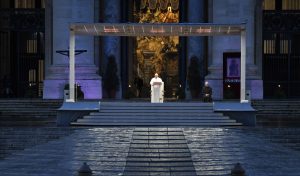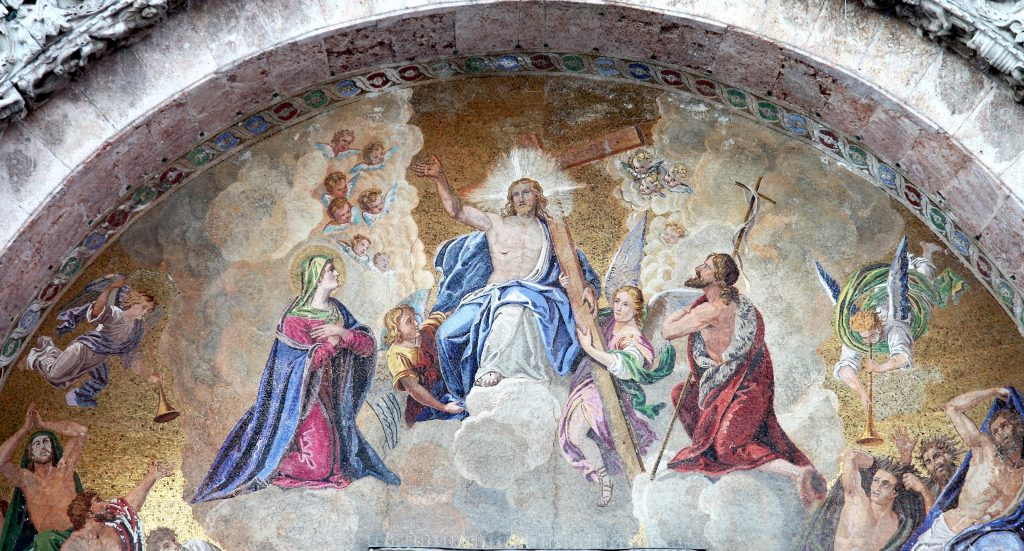A priest friend of mine always likes to remind himself that Jesus’ passion, death, and resurrection are all one event. Perhaps that’s why we seem to celebrate them so relatively quickly together, going from Palm Sunday, to the Triduum, to singing “Alleluia!” once again.
This year, Easter has me almost constantly thinking about Christmas. For a number of years now, some of my favorite images of Jesus involve him as an infant holding the banner of victory.
It’s another reminder that not only should we not be thinking about Jesus’ passion and death without the resurrection, but that we shouldn’t cordon off the incarnation either: It’s all one event, all one story, the big picture that makes our lives make sense!
And so, I was grateful on the approach to Holy Week the other day when I unexpectedly found some pine needles left over from Christmas! A small thing (they were literally quite tiny) but one that seemed no accident.
As we suffer from the coronavirus (COVID-19) agony — which, depending on where you are, almost certainly means going without the reception of the Eucharist, and limited or no opportunities for confession or adoration of the Blessed Sacrament in the ways we are accustomed to — it’s more important than ever to have confidence in the whole story of our redemption.
It’s been striking that all of these coronavirus-related changes to our lives have come during Lent, a season of penance and sacrifice. But we cannot survive the Passion without a deep knowledge of the Resurrection, because with it comes a confidence in the truth of it all that will keep us moving forward with an ever-deeper faith in the Lord.
Remember the prayer, I must decrease, God must increase? This, I believe, is what this time is all about. Choosing to sit and be anxious at every new televised press conference, or boldly insisting trust in God is the only way to fly. The other options won’t help anyone and certainly won’t show the light of Christ in a world desperately longing for it.
Some crucifixes depict the risen Lord, rather than the body of a broken man, even on the cross. Sometimes they are done well, other times maybe not so much. In any case, they convey a message to treasure, a herald, a beacon to show the way. The big picture is essential. It’s the game-changer. It’s transformational, even when we experience Easter in a whole new, even brutal, way.
This year, I wonder, too, in a new way: Is this the entry way for many? To see the suffering but to be able to have a view of the victory at the end of the agony? As the suffering and agony is inescapable in the world, could even a basket full of Easter eggs be an opening to salvation, a ticket to eternal life with God?
It’s probably more important than ever in our lives to share the Easter joy, in whatever ways to begin — or continue — the conversation. However you open the door at a time of social distancing, with prayer and perseverance in charity, God will make himself known in the confusion of these days.
I keep hearing the words of Pope Francis at his Lenten “urbi et orbi” (“to the city and the world”) meditation and prayer service held March 27 amid the growing pandemic, watched live by an estimated 11 million people around the world. “What are you afraid of?” Pope Francis asked repeatedly, echoing the words of Jesus. I take that and think in reply: When I really am honest, especially in the time of the coronavirus, the question becomes, “What am I not afraid of?”
The message here is clear: Offer it all to the Lord — the fear, the anxiety, the wounds life has inflicted and continues to. Nail it all to the foot of the cross. See in the Easter morning light that you are free! Fear can’t destroy you. Death can’t destroy you. Don’t let yourself be robbed of Easter joy.
Before we get to Easter morning, though, there is always Holy Saturday. And Holy Saturday, every year, seems more and more difficult to me. Some years, I’ve been known to just wander around Good Friday night and some of Saturday. Nothing seems right.
Sometimes, in Manhattan, churches will be open. One year, I encountered a Dominican parish that had Christ laid out in a tomb. I got on my knees and wept. I know God is present, but he seems distant, too painfully distant. It feels as if he has abandoned us and the thought can make one inconsolable.
And this is a feeling that is not all that unfamiliar to many of us right now.

There’s an ancient homily by an unknown author that is read every year in the Liturgy of the Hours on Holy Saturday that I’ve been thinking about on a daily basis lately. It begins addressing the obvious: the strangeness.
The homilist names the “great silence on earth” and stillness that marks the period between Christ’s death and resurrection, an unfamiliar state that perhaps has suddenly eerily become too familiar, with our empty streets, 6-foot distances, and the suspicion that greets even an approaching delivery worker these days.
“The whole earth keeps silence because the King is asleep,” the homily reads. And hasn’t that been a real temptation lately? To believe God has taken one long nap, to leave us to fend for ourselves for a while?
So how do we move from this frankly traumatic Lent into Easter? How do we experience Easter joy when we are all worried about an invisible menace?
Some of the answer is in that ancient Holy Saturday homily. God, first of all, hasn’t abandoned us. He’s getting souls who would otherwise be lost out of the pits of hell. Maybe he’s doing just the same thing at this time that has thrown us all off our regular routines, suddenly not able to pretend that we have forever.
It’s beautiful how the homily puts it:
“The earth trembled and is still because God has fallen asleep in the flesh and has raised up all who have slept ever since the world began. God has died in the flesh and Hell trembles with fear. He has gone to search for our first parent, as for a lost sheep. Greatly desiring to visit those who live in darkness and in the shadow of death, he has gone to free from sorrow the captives Adam and Eve, He who is both God and Son of Eve. The Lord approached them bearing the Cross, the weapon that had won him the victory. At the sight of him, Adam, the first man he had created, struck his breast in terror and cried out to everyone, ‘My Lord be with you all.’ Christ answered him: ‘And with your spirit.’ He took him by the hand and raised him up, saying, ‘Awake, O sleeper, and rise from the dead, and Christ will give you light.’ ”
Every Easter is about this, but now more than ever: Easter will set people free. We are not bound to sin and death. Let him release you. From the Annunciation to Christmas to Easter, this has been a rescue mission!
It may seem a tricky thing, when maybe it’s hard or impossible to get yourself to confession this year. And maybe this year was going to be the first time in a long time. If confession isn’t available where you are, go to the Lord, as Pope Francis recently reminded us how to do.
Baptism means that he lives in you and you live in him. Some of this “awakening” that the coronavirus is forcing is an opportunity before it is too late for many of us to see what the implications are for our lives when we say we are Christian.
Lukewarm doesn’t cut it. Box-checking Mass attendance doesn’t cut it. Love is the mission, as the theme of Pope Francis’ visit to the U.S. in 2015 put it. It’s a radical love. It’s the whole story of salvation history. It’s Jesus Christ. True God and true man so that evil may not win.
That’s got to be what Easter is about for us. Waving the banner of his love as we continue to see fear and death. There’s so much more to see. Our year, as always, began in the octave of Christmas. And on Easter morning we see just how splendid that holy night was, seeing the face of the Father who loves us every day of the struggle.
And we can even struggle with joy because, alleluia, not only is Jesus risen, but we rise with him, every day we let him be the Lord of our hearts for real.

